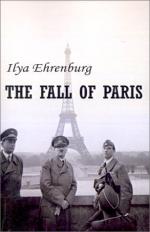|
This section contains 389 words (approx. 2 pages at 300 words per page) |

|
Mr. Erenburg's account of the French defeat ["The Fall of Paris"] is a novel chiefly by virtue of the fact that it is such inaccurate history—another of those literary demonstrations that the Communist Party is the only solution for the ills of the world, and another instance of the vital connection between a writer's prose and his political purpose. For Mr. Erenburg's vague, discontinuous, lifeless, impressionistic prose is the perfect instrument of his political partisanship. It is such a befuddling prose, it so beclouds the sequence of historical facts, that I very much doubt whether any but a reader fairly well acquainted with the complex history of modern Europe would realize that in 530 pages on the history of France between 1935 and 1940 there has been hardly a mention of Russia, except as a flag on the horizon, and except for one oblique reference to a newspaper headline, not...
|
This section contains 389 words (approx. 2 pages at 300 words per page) |

|


